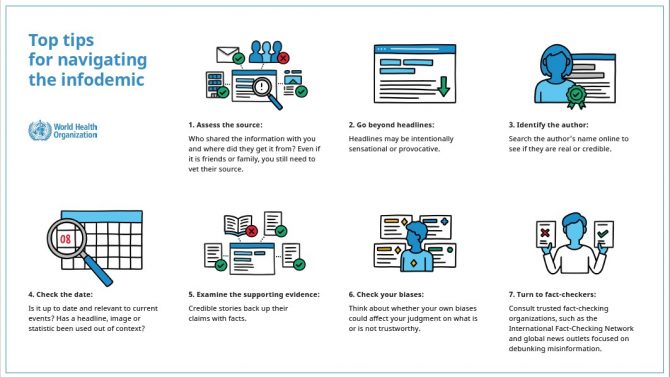There is a lot of information to sort through around COVID-19, both in print, online and on social media. How do you determine what is reliable and what is not, while also staying up-to-date on the latest information? Here are some things to think about as you read and consume COVID-19-related media online.
Take a Breath
A simple step, but one that is extremely important in order to be a responsible information consumer. Reading through the news or scrolling through social media can sometimes provoke emotional responses and create the urge to immediately share an article or develop a conclusion. This is when misinformation and disinformation are more likely to be spread. So, before you hit the re-share button on Facebook, take a pause and dig deeper.
Read Beyond the Headlines
It can be tempting to stop at just the headline. However, if we only read headlines, we miss out on context or nuance. It is also important to be wary of sensationalized headlines, which can elicit charged feelings and emotions that hook readers in or aim to get more clicks.
Evaluate the Source
When reading through news articles or social media posts, ask yourself if the sources that are cited or consulted are reliable and reputable. University of San Francisco (UCSF) Health outlines questions to consider when evaluating the trustworthiness of health sources online:
- Who published the information?
- Who are the authors?
- What are their credentials?
- Do the authors have a hidden agenda?
- Is the information peer reviewed?
News Literacy Project, a nonpartisan national education nonprofit, created a resource guide focused on evaluating COVID-19 information and identifies the following reliable sources for COVID-19 information:
- World Health Organization.
- Centers for Disease Control and Prevention
- Johns Hopkins University & Medicine
- Federation of American Scientists
- USAFacts’ Coronavirus Hub and Tracking Map
- SAS Institute’s Coronavirus Dashboard
- CovidActNow.org
- Massachusetts Department of Public Health
- City of Boston COVID-19 Information
- Boston Public Health Commission
- Local health agencies
Look at the Original Source
Another great step in determining the accuracy of a claim or information is to head straight back to the original source. This step can also help us check the context of the reporting. Is a social media post discussing information from an official health organization? Head to the official website to double check claims. Is a Facebook post quoting a comment made by an official at a recent press briefing? Try and see if there is a video of the briefing and watch it in its entirely for context.
Keep Reading
Another way to help determine if the information you are encountering is factual and accurate is to see what others are saying about the topic. Are other news outlets reporting the same information? Or are there discrepancies? Alternatively, if no one else is reporting on the information, that also could be a red flag. Mike Caulfield, a digital media literacy expert at Washington State University Vancouver, has a helpful discussion on how to perform a “news search cross-check” to find additional coverage on his media literacy resource blog Sifting Through the Pandemic.
Be on the Lookout for ‘Red Flags’
University of San Francisco (UCSF) Health also provides a list of ‘red flags’ to watch out for that could signal health-related information could be inaccurate:
- The information is anonymous
- There is a conflict of interest
- The information is one-sided or biased
- The information is outdated
- There is a claim of a miracle or secret cure
- No evidence is cited
- The grammar is poor and words are misspelled
Additional Links for Evaluating and Fact-checking COVID-19 Information
- "Beware of Fraudulent Coronavirus Tests, Vaccines and Treatments" - Food and Drug Administration (En español)
- Snopes on COVID-19
- Coronavirus Rumor Control - Federal Emergency Management Agency (FEMA) responses to COVID-19 rumors
- FactCheck.org on COVID-19
- Mythbusters by the World Health Organization (WHO)
- “5 Quick Ways We Can All Double-Check Coronavirus Information Online”- First Draft News.org
- "Let's Flatten the Infodemic" - The World Health Organization (WHO)
Please note, the above information is not meant to replace advice from medical professionals. Please contact your health care provider for questions and concerns related to COVID-19.





Add a comment to: Evaluating Information on COVID-19 in the News and Social Media